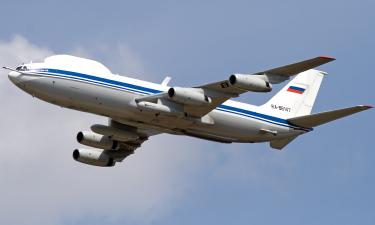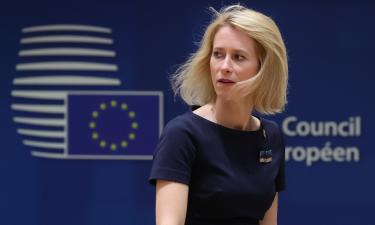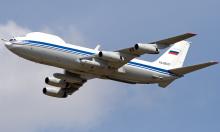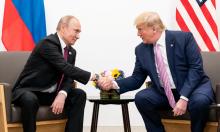Terrorism and Politics
Many respectable economists have negatively evaluated the recent declarations of changes in policy of Russia made by the President Putin in terms of economic status of Russia and its appeal for investors. Yevgeni Yasin, the scientific director of the State University Higher School of Economics, provided us with his point of view on this matter.
Yevgeni Yasin: "The State wants to get hold of as much power as possible, and the society should resist that. In our country only the first part of the formula works".
- Will the political course change because of the last events, which are characterized by many politicians as the building of a strict vertical of power?
- I would say that recent proposals of the President mean the change of polity of Russia. I am not a law specialist and I can't say that the Constitution is violated, but from my point of view this changes are directed against the democratization of the country and towards the authoritarian regime. The increase of expenditures for national defense and security put in the budget of 2005 will benefit the
economy at first. So I can't say that it will be bad tomorrow. Besides, democracy is connected with certain expenses, competition for instance. That was one of main arguments of planned socialism advocates – that it will remove all the expenditures of "rapacious" competition. They managed it, in a way. But we know the ultimate result.
You can also say that strong regime, which combines authoritarian vertical with the unity of the country, will lead to the point when political stability would be a necessary condition of prosperity. Of course, there are examples when in some countries this model worked for some time, but the most developed countries are all purely democratic. I think they've gone through hard times, but finally the forms in which the economy works at its best were found. And we should have gone that way, but it seems to me that we won't.
- Do you agree that economic society can't influence this situation?
- Sure it can't. It is in depressed state. It is frightened and follows the principle to "stay low".
- Will the strengthening of defense weaken other sectors of economy?
- This is the matter of priorities. I can't say that 50 billion rules spent for the army will restrain the country. The army has just too many needs that weren't paid attention to for a long time. Right now the Armed Forces are in such deplorable state, that it's impossible to put too much money in it. We are getting super incomes from the oil export so we can afford some super expenses. But should we put them all in the army? I doubt that. If I could I'd spend this money on science, education, on innovative business projects that would revive the creativity of Russians.
- How would this last changes correlate with plans of doubling the GNP, in your opinion?
- If you would ask mister Putin or mister Kudrin the same question, they would answer positively. If you would ask me, I would say negatively, because I am sure that the time to use authoritarian methods in Russia has gone. But I agree with them that we need political stability. But I would add that we need democratic institutions in which political stability goes with high dynamics. I think we deserved it after all.
- Can we say that the economy of Russia eventually gets militarized?
- Well, Russia is all militarized for long. I would say that our perception is defensive. "The enemy is everywhere". If somebody tells that we need to add some limitations in the name of public safety – we agree easily. Right now the war with terrorism goes on. All over the world people are checked by metal detectors and all other similar measures are taken. And all over the world this measures are discussed in the way they affect human rights. Our authorities will possibly face the criticism from this side. And I am sure they reply similarly to Mr. Bush's and his administration's reply to Americans: do you want repetition of September 11th? Do you want the repetition of Beslan? Stand it, then.
The main difference between the situation in Russia and the USA is that American citizens wouldn't ever forget about their rights and they'll insist on their rights observance, but Russians will forget about them because we're not used to it. Everything that is done by the authorities will be considered in the light of terrorists' threat. We'll be told that we need to sacrifice commercial classified information, freedom of movement to security. This is very bad. The problem of human rights and freedoms in Russia is much more critical than in other countries.
- Does that mean that terrorists' actions are favorable for the regime?
- Such idea, that Basaev could have been acting in the interests of the authorities, visited me. And I must say that I find terrorists' actions favorable for the regime.
- And what do you think about statements of the highest authorities - Vladimir Putin and Sergei Ivanov that terrorists declared war to us. Who else if not the Supreme Commander-in-Chief and the Minister of Defense should know that?
- I don't think so. We are living in the situation of internal armed conflict in which the opposing force is weaker and uses the weapon of the weak. Terror is the weapon of the weak. I am more than 70 years old, I've survived the Great Patriotic war and I know what war is like. This is a completely different story comparing to what we're seeing now.
- How much time will our country need to become fully militant, hypothetically?
- Not much, really. But that won't happen. Our national doctrine is heavily oriented on American: local conflicts, elite troops, "clever" weaponry etc. Of course, a country like Russia should be armed correspondingly. The most dangerous for us now is the restoration of "defensive" perception, the feeling that we are surrounded by
"enemies". Such situation is best suited for total control over the nation. And that's deadly for Russia.
- Let's talk about some of the sectors of economy that were or will be changed due to the recent events. Should the law about terrorists' financing be put into the banking rules?
- As for me personally, I am not waiting anything good from this law. In the same time I know that similar limitations work in many countries. But in the western countries all this limitations work in the context of law and business can always count on just judgment and we'll have plain arbitrariness. Any limitation in Russia is more
dangerous than in US. The same applies to Khodorkovski's case, in which I see only arbitrariness.
- And how will it affect the investment climate in Russia?
- Only negatively. Direct investments to Russia are very scarce. There are mostly credits that we would need to pay back. Foreign businessmen are afraid and they'll be afraid to invest money into Russian economy, while Russian businessmen try to stay as low as possible. Such business can't be successful. There is an ability to make good profits in Russia to but the risk of losing money is also very high. And the risks grew up recently. The events around YUKOS will have far-reaching negative consequences for the Russian economy.
- So, we can't rely on foreign investments. But everything goes well as the prices for oil are quite high. What would happen when they fall, how do you think? And what will happen with the Stabilization fund that is supplied by the profits from the oil-sells?
- Hmm, I don't think anything will happen with the Stabilization fund. If it will have time to accumulate enough money it will benefit us, since we'll have time to overcome hardships connected with low prices for oil. Well, we'd have to start working, thinking how to raise productivity, competitiveness… I think we have 3-4 years in reserve. In this time high prices for oil will influence Russian economy, positively. They will let us gain high dollar profits to transform them into rubles, to continue the policy of raising monetization of Russian economy. This is one of the key factors for high rates of economic growth.
Then, in 2-3 years even if the prices for oil will remain high it will not benefit us, as the real economy will have enough money. In this time the factor of confidence would have started working. But it is almost absent in Russia. If we'll be rebuilding our institutions to gain more confidence, we'll be able to catch up with developed countries. But I don't see that anybody is thinking about gaining more confidence, and economic growth will stop in the following 3-4 years. So Mr. Putin is just lucky.
- Is the return of the "Iron Curtain" possible?
- I don't think so. But I must admit that I couldn't predict the present situation also. So, I can't give any guarantees. All the problems we have now – are the problems of the society and people. The only thing needed to prevent the establishment of the authoritarian regime now is the social resistance – the activity of people that are against of being turned into swines, again.
- And how long will we have to wait for such activity to wake, 70 years more?
- Hell knows. Time is passing by faster than before. To be honest, I am being shocked with all this changes and it's hard to forecast anything. Putin said once: it's natural that the State wants to get hold of as much power as possible, and the society should resist that. We have only the first part of the formula working. Our society isn't resisting, it's happy that it has got a new "father".
- But the status of pensioners doesn't become better, for instance. They are offered the monetization of privileges but they refuse, because they understand that they won't get any adequate substitution for privileges.
- I understand that freedom won't benefit pensioners directly, but at the same time I understand that the only way to the growth of prosperity of people is the open market and free political system. If that would not exist we won't have anything to feed the old ones.
- What are you, personally, going to do?
- I am doing. Giving the interview to your newspaper, for instance.
Evlaliya Samedova
Translated by Dmitry Pavlov
Subscribe to Pravda.Ru Telegram channel, Facebook, RSS!




